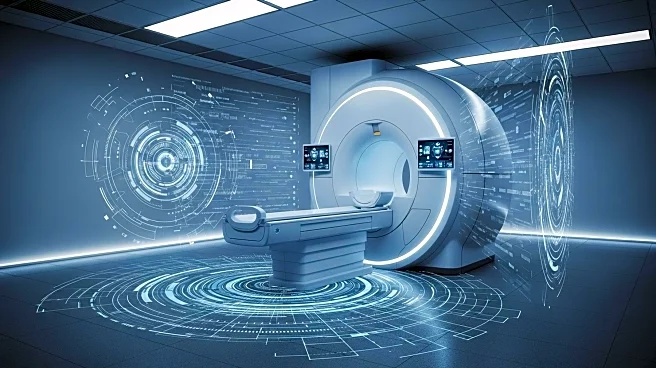What's Happening?
Medtech companies, including GE Healthcare, Nvidia, and Amazon Web Services, are pioneering the use of foundation models in radiology. These AI models, trained on extensive datasets, are designed to detect multiple health conditions from medical scans. Despite their potential, the regulatory framework for these technologies remains unclear. Khan Siddiqui, CEO of AI startup HOPPR, highlights the increasing workload in radiology and the need for comprehensive AI models. HOPPR has developed a foundation model trained on a vast dataset of chest X-rays, which it offers to other companies for further development. The FDA has approved over 950 AI-enabled devices in radiology, yet the integration of foundation models poses new challenges. Companies like Aidoc and Radiology Partners are also exploring these models, aiming to enhance accuracy and reduce development time for derivative models.
Why It's Important?
The adoption of foundation models in radiology signifies a shift towards more integrated and efficient healthcare solutions. These models promise to streamline diagnostic processes, potentially alleviating the burden on radiologists and improving patient outcomes. However, the lack of a clear regulatory pathway poses risks and uncertainties for developers and healthcare providers. Successful implementation could lead to significant advancements in medical imaging, but it requires careful navigation of data privacy, security, and FDA approval processes. The development and deployment of these models could set a precedent for AI integration in other medical fields, influencing future healthcare policies and practices.
What's Next?
As companies continue to develop and refine foundation models, collaboration with regulatory bodies like the FDA will be crucial. The industry may see increased partnerships between tech firms and healthcare providers to ensure compliance and optimize model performance. Ongoing feedback from radiologists and healthcare professionals will be vital in fine-tuning these technologies. The success of these models could lead to broader adoption across various medical disciplines, potentially transforming the landscape of AI in healthcare.
Beyond the Headlines
The ethical implications of using large datasets for AI training in healthcare are significant. Ensuring patient consent and data security is paramount, as is maintaining transparency in AI decision-making processes. The shift towards foundation models may also impact the job market for radiologists, necessitating new skills and training to work alongside AI technologies. Long-term, these developments could influence public trust in AI-driven healthcare solutions.











